In this article:
Your bones are the framework on which your body is built. They support you and allow you to move. Several factors play a role in improving bone health. These are diet, exercise, and lifestyle.
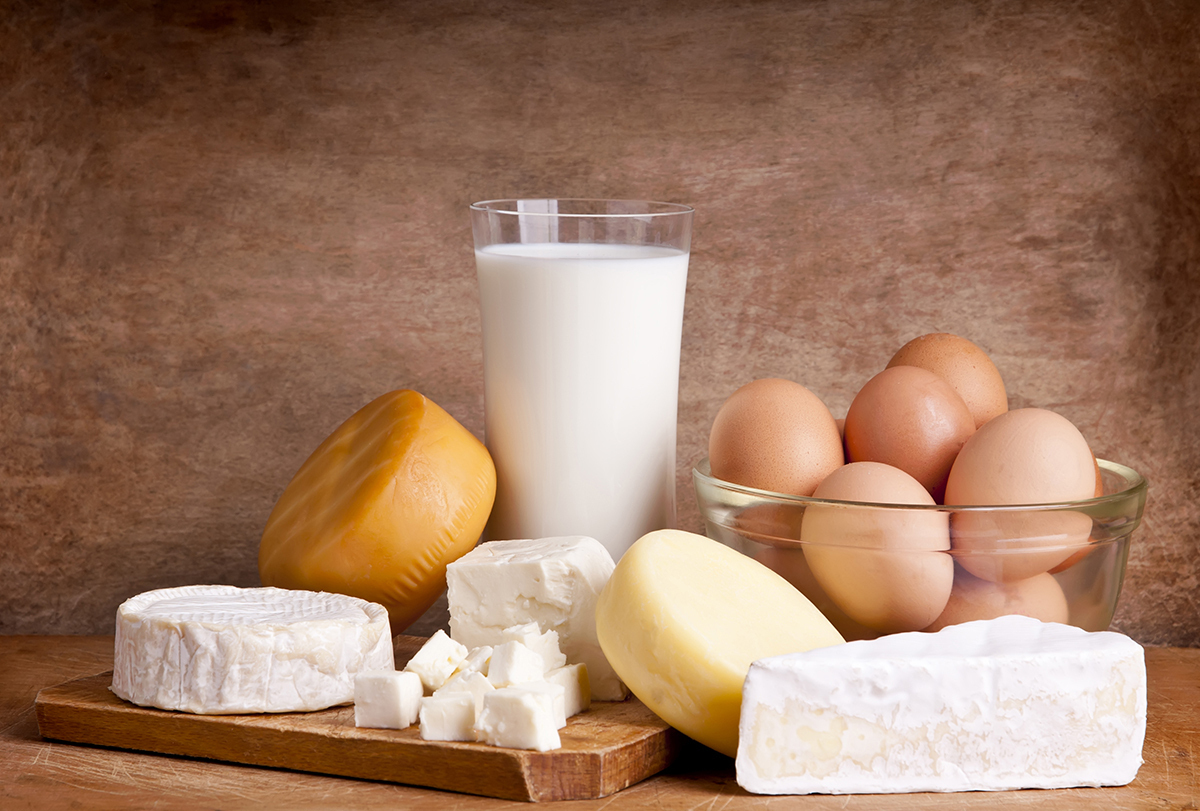
Bones are made up of two chemicals – calcium and phosphorus. Hence, an adequate intake of these two minerals is important for the formation of good, strong bones.
In addition, vitamin D is needed to help in calcium absorption and deposition in the bones. Therefore, adequate intake of vitamin D is also important for healthy bone formation.
Sufficient intake of these vital nutrients is particularly important during childhood, adolescence, and early adulthood when bones are developing. Strong, healthy bones in early adulthood delay age-related changes. As you grow older, your bones also age, resulting in conditions such as osteoporosis and other bone-related problems.
Insufficient intake of vitamin D and calcium aggravates the conditions resulting from bone deterioration. Hence, sufficient intake of calcium and vitamin D is recommended as the first line of treatment for bone-related disorders affecting the elderly. However, not many are aware that this alone is not enough to strengthen the bones.
Nutrients such as magnesium, silicon, vitamin K, and boron are also essential contributors to bone health. (1)(2) Moreover, specific nutritional factors may also improve calcium metabolism and bone formation.
The process of bone deterioration begins in the late thirties in most young adults and, if left unchecked, could lead to weakening of the bones. A healthy lifestyle coupled with intake of nutritious foods that strengthen bones is strongly recommended to prevent bone-related disorders.
This article brings you a summary of some of the bone-strengthening foods.
Foods for Strong Bones
Here are the top foods for strong bones.
1. Dairy products
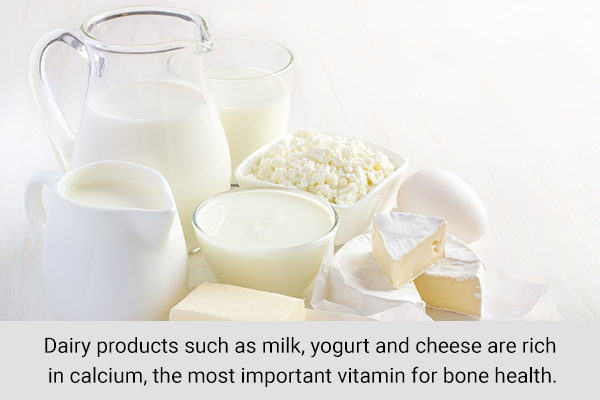
Dairy products such as milk, yogurt, and cheese are rich in calcium, the most important vitamin for bone health.
You can easily meet 52%–65% of your daily calcium requirement with the recommended intake of milk and other dairy products. In addition, they are a great source of protein, potassium, and phosphorus, all of which are necessary to maintain bone health. (3)
The USDA recommends a daily intake of 1 cup of fat-free milk and a cup of fat-free yogurt for good, strong bones. (3)
2. Nuts
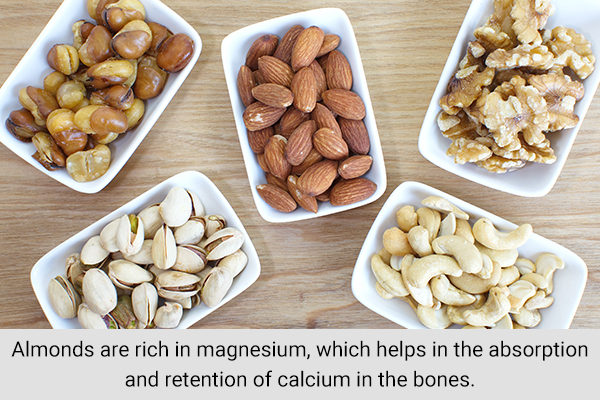
Among nuts, almonds have a high content of calcium and are also rich in magnesium, which aids in the absorption and retention of calcium in the bones.
Walnuts are also rich in magnesium, though the content is lesser than that in almonds. However, walnuts are rich in omega-3 fatty acids and alpha linoleic acid, which protect the bones from age-related deterioration and damage.
Brazil nuts are another rich source of magnesium and omega-3. (4)
3. Whole grains and cereals
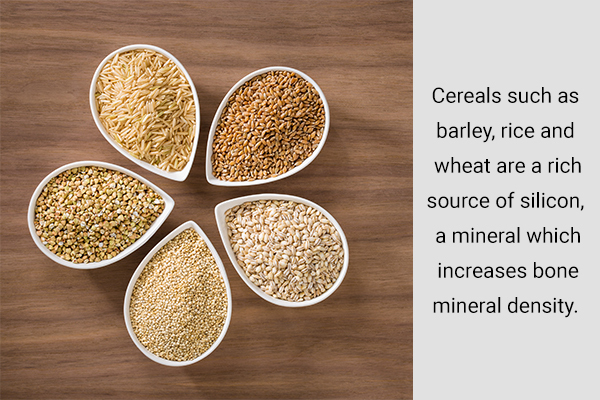
Cereals such as barley, rice, and wheat are great sources of silicon, a mineral that increases bone mineral density. Some types of mineral water contain a high concentration of silicon as orthosilicic acid. (1)
The mechanism of action of silicon, though unclear, seems to be through the stabilization of the collagen in the bone matrix. (5)
4. Seeds
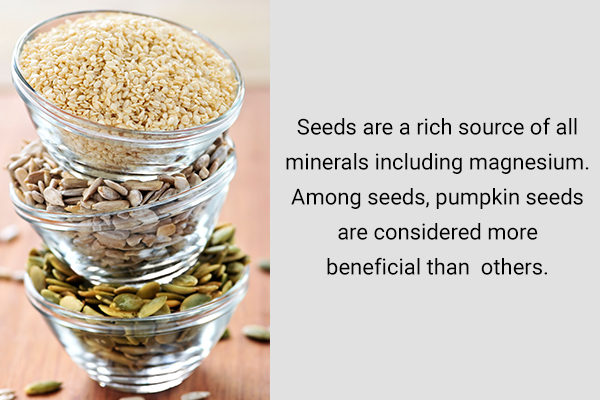
Seeds are rich sources of minerals including magnesium.
Among seeds, pumpkin seeds are more beneficial than others. Including pumpkin seeds in your diet can help you build strong, healthy bones. (6)
Roasted pumpkin seeds are very palatable. You can roast some pumpkin seeds along with spices of your choice to prepare a tasty, healthy snack. Add roasted pumpkin seeds to your soups, salads, oatmeal, and curries or bake them into muffins or pancakes.
Grind a handful of soaked pumpkin seeds and add them to burgers or pasta sauces for an additional boost and for fussy eaters.
5. Fruits
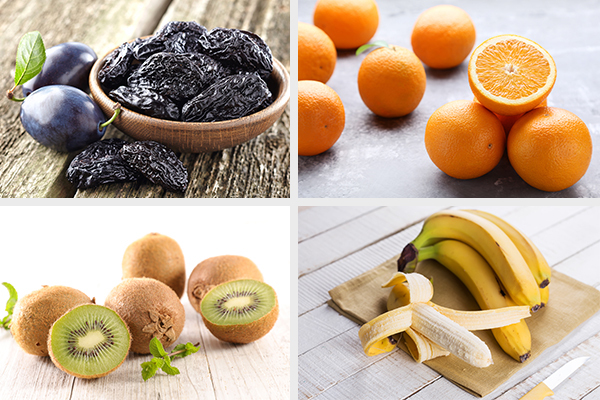
Many fruits are rich in minerals and vitamins that help in building stronger bones.
a. Bananas and kiwis
Bananas are rich in potassium and contain moderate levels of magnesium. Additionally, they are rich in fructooligosaccharides, which are nondigestible carbohydrates. These not only provide dietary fiber but also help in calcium absorption, which is vital for the formation and maintenance of strong, healthy bones.
Like bananas, kiwis are also rich in the bone-protecting mineral potassium. (7)(8)
b. Prunes
In addition to being sweet, prunes, which are a form of dried plums, are rich in the carbohydrate inulin, which helps in increasing calcium absorption and retention.
Prunes are also a source of potassium and vitamin K (9)(10) which are known to increase bone strength and promote the healing of fractures.
Prunes, raisins, and dried apricots are abundant sources of boron, which improves the absorption of vitamin D, which is needed for building good strong bones. (1)
c. Oranges
Oranges are packed with vitamin C, which is essential to the formation of collagen, a protein necessary for binding bones and muscles to help in the smooth movement of the joints. They also contain inositol, a type of carbohydrate that increases calcium uptake by the bones.
Regular consumption of oranges, either as whole fruit or juice, prevents osteoporosis. (11)
6. Vegetables
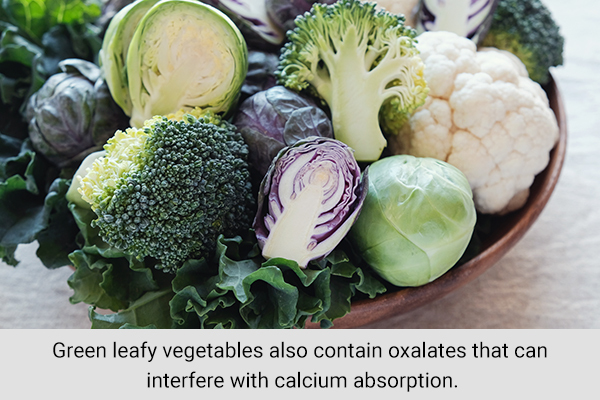
Green leafy vegetables such as spinach are replete with calcium. (12) Other vegetables that are calcium rich include broccoli and cabbage, which can not only supply you with the much-needed calcium, but being rich in proteins, they also help in strengthening muscles and delivering a great degree of flexibility to joints.
Green leafy vegetables also contain oxalates, which can interfere with calcium absorption. Blanching the leaves before cooking can help lower these oxalates.
7. Crabs
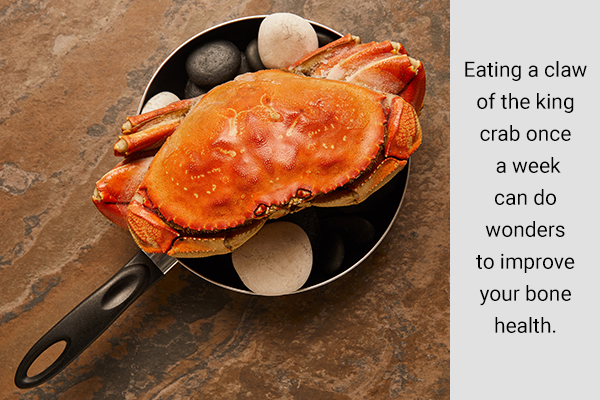
King crabs are rich in zinc. This mineral has been recognized recently to help in increasing bone density and thus in preventing osteoporosis. (13) Eating a claw of king crab once a week can do wonders to improve your bone health.
Shellfish are another great source of zinc.
8. Fish
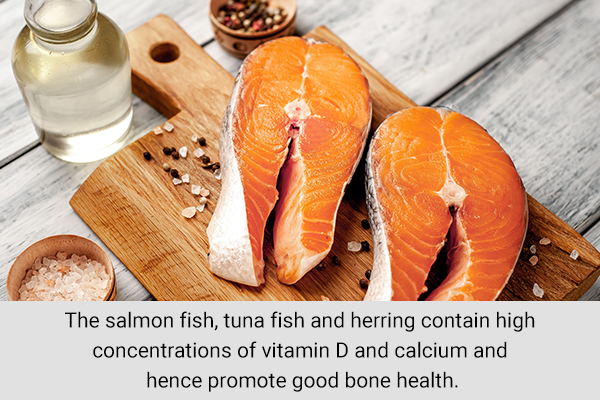
Salmon fish, tuna, and herring contain high concentrations of vitamin D and calcium and hence promote good bone health. Additionally, they are teeming with omega-3 fatty acids and thus help to prevent bone loss and bone damage due to osteoporosis and fractures. (14)
9. Soy foods
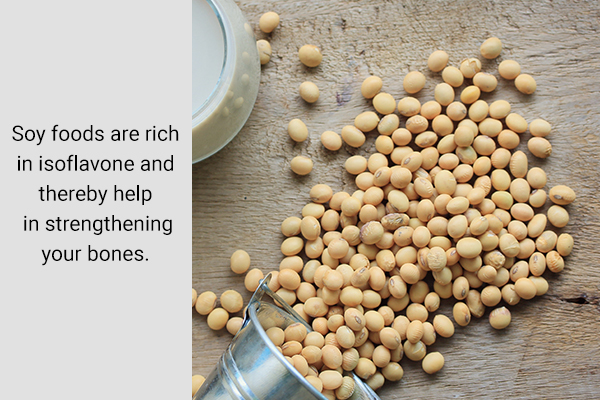
Isoflavone, a type of organic compound, promotes good mineral bone density.
Soy foods are rich in isoflavone and thereby help in strengthening your bones. Furthermore, soy foods such as tofu contain high amounts of calcium, which is needed for the formation of bones. (15)
10. Bok choy
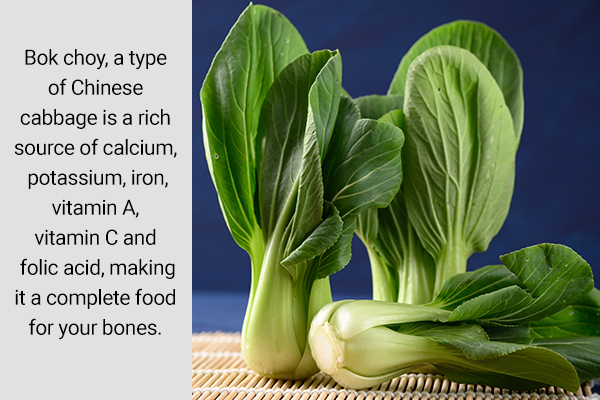
Bok choy is a type of Chinese cabbage that is a rich source of calcium, potassium, iron, vitamin A, vitamin C, and folic acid, making it a complete food for your bones. (16)
Additional Tips Beneficial for Bone Health
- Take your vitamin supplements regularly.
- Track your intake of foods rich in calcium and vitamin D.
- Avoid excessive smoking or alcohol consumption.
- Exercise regularly.
- Maintain a healthy lifestyle coupled with a healthy balanced diet.
Most-Asked Questions
What should I avoid to maintain good bone health?
Avoid smoking and too much alcohol intake. Refrain from eating junk foods, and do not lead a sedentary lifestyle.
What exercises are good for building healthy bones?
Weight-bearing activities such as weightlifting, running, and jumping are good for building healthy bones.
Other bone-beneficial exercises include yoga and Tai chi. Yoga improves muscle strength and flexibility, and Tai chi improves balance and strength.
Final Word
Bones are living tissue, and every day your body breaks down some of this tissue and puts new ones in its place. As you age, more bone tissue is broken down and less replacement takes place. As a result, the bones become weaker with age.
A foolproof way of preventing this from happening is to ensure strong bones are built in the childhood and adolescent years before age-related changes start.
Building good strong bones requires a combination of good food, exercise, and maintaining a good lifestyle, which includes avoiding addictive habits such as smoking tobacco and excessive alcohol intake.
- Was this article helpful?
- YES, THANKS!NOT REALLY


